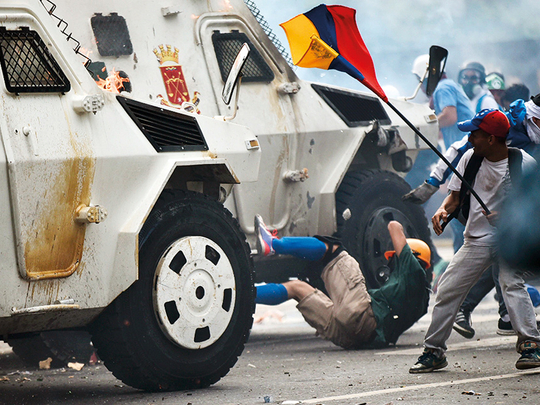
CARACAS: University students in Venezuela will lead a fresh round of marches against President Nicolas Maduro today, a day after police fired tear gas and protesters hurled Molotov cocktails in rallies against his plan to rewrite the constitution.
Violence erupted in the latest of more than a month of clashes that prosecutors say have now killed 32 people in the oil-rich nation stricken by shortages of food, medicine and other basics.
Government forces used tear gas and water cannon against demonstrators marching along a highway in east Caracas, the prosecutor’s office said. Protesters fought back with rocks and Molotov cocktails.
More than 300 people were injured in Wednesday’s unrest, officials said.
The latest fatality was that of an 18-year-old male struck by a projectile.
A Venezuelan national guard armoured vehicle careened into a crowd of antigovernment demonstrators in Caracas that left at least 161 people injured.
The newspaper El Nacional published videos on Wednesday showing the vehicle backing up as a gasoline bomb burst on its windshield.
Crowds raced toward the vehicle and then suddenly fled as it advanced, and masked soldiers battled protesters in a chaotic melee. Rocks, bottles, shots and tear gas filled the air. One person was confirmed dead in Caracas.
Injuries throughout the city included 134 traumas and 17 cases of people overcome by gas, Mayor Ramon Muchacho of the opposition-dominated Chacao municipality said in a post on his Twitter account. Those hurt included lawmakers Freddy Guevara and Julio Montoya.
In a video that went viral on social media on Wednesday, Maduro was shown dancing on state television. The camera pans out a window to show national guard troops firing tear gas at protesters in eastern Caracas.
Looting broke out for a second straight night in the northern city of Valencia.
In Caracas, at least one protester caught fire when other demonstrators set ablaze a military motorcycle. Another was struck by an armoured car.
The clashes broke out after riot police blocked demonstrators from advancing towards government buildings in central Caracas, where Maduro addressed a rally of thousands of his supporters.
The opposition accuses the elected leftist president of manoeuvring to strengthen his grip on power. He has for months been resisting calls for a vote on removing him from office as the country staggers under food shortages, a near-crippled state-run economy and one of the world’s highest inflation rates.
Daniel Ascanio, a student leader from Simon Bolivar University, told reporters that students will march from campuses on Thursday around the country to demand “democracy and freedom.”
“We will be joined by unions, homemakers, and lawmakers. All sectors of society will mobilise to send a message to Maduro,” said Ascanio.
Clouds of grey smoke from tear gas canisters filled the air on Wednesday as police with riot shields and trucks advanced along the highway in eastern Caracas.
Protesters were enraged most recently by the socialist president’s launching of procedures by the electoral council to elect a body to draw up a new constitution.
“I am convening a national constituent assembly of citizens with deep popular involvement so that our people ... with their voice can decide the destiny of our homeland,” he said in a speech at the council.
Private polls indicate that more than 70 per cent of those interviewed do not support Maduro, chosen in 2013 to succeed his late mentor Hugo Chavez.
Maduro said the constitutional reform body would not include political parties with seats in the opposition-controlled National Assembly, but representatives of social groups traditionally loyal to him.
As the unrest played out in the streets, powerful pro-Maduro lawmaker Diosdado Cabello went on TV to show footage of a jailed opposition leader, Leopoldo Lopez, to show he was alive and counter rumours he had died in prison.
Maduro’s centre-right opponents and some international powers said the move on the constitution is an attempt to dodge local elections this year and a presidential poll set for late 2018.
“It is a fraud by Maduro’s side,” said the president’s most prominent opponent, senior opposition leader Henrique Capriles.
“Since they cannot win elections, they want to impose the Cuban electoral model to keep themselves in power,” he said.
Cuba, the sole one-party communist regime in the Americas, is Maduro’s closest ally.
Maduro’s own attorney general, Luisa Ortega, is unpopular with dissidents for her prosecution of opponents of the Maduro government.
Yet she surprised many in March condemning as a break in constitutional order the High Court’s suspension of the National Assembly — the only body not in the hands of Maduro supporters.












